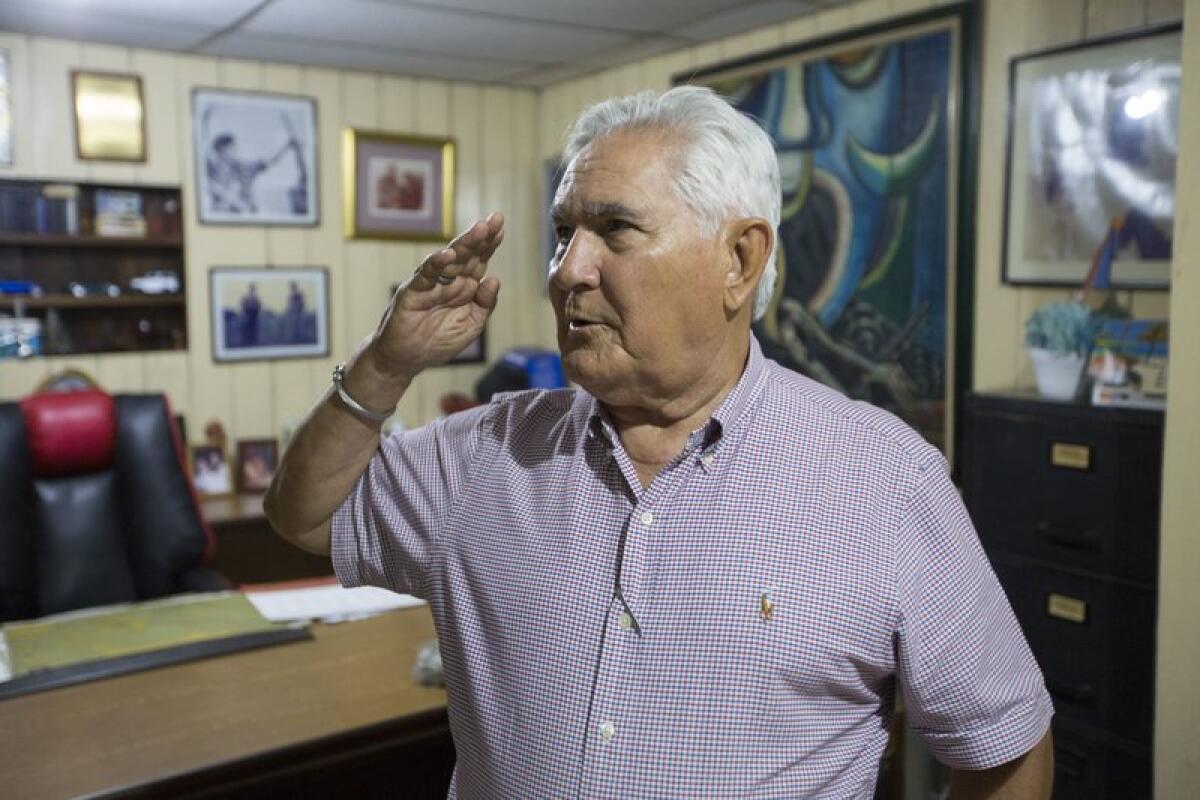Edén Pastora, charismatic Central American revolutionary, dies at 83

- Share via
MANAGUA, Nicaragua — Edén Pastora, one of the most mercurial, charismatic figures of Central America’s revolutionary upheavals, has died at a military hospital in Nicaragua’s capital.
On Aug. 22, 1978, Pastora, better known as “Commander Zero,” led a group of guerrilla fighters in an armed takeover of Nicaragua’s national Congress, becoming the subject of an iconic image that showed him with a rifle raised above his head as he boarded a plane to escape to Panama and then Cuba.
After the photo circled the globe, Pastora’s comrades dubbed him “Commander Kodak” for pulling off the kerchief all had been wearing as a mask and mugging for the camera. Their daring mission succeeded in freeing 60 Sandinista prisoners and shook dictator Anastasio Somoza’s hold on power.
Alvaro Pastora, one of his sons, said he died early Tuesday at Managua’s Military Hospital of respiratory failure. He was 83.
Edén Atanacio Pastora Gómez was born Nov. 15, 1936, in Ciudad Darío, Nicaragua. His father was killed when he was 7 — he blamed the agents of the Somoza family dictatorship — and his mother sold land to help finance his education.
Pastora dropped out of a Mexican medical school in 1962 and joined the Sandinista National Liberation Front, which battled the Somozas. He was caught and jailed three times over the next 11 years before taking time out to become a shark fisherman in Costa Rica.
He returned to the fight three years later. His 1978 raid on Congress made him one of the country’s biggest heroes when the rebels toppled the dictatorship a year later.
Charismatic, folksy and controversial — he later said he had fathered more than 20 children — Pastora was named vice minister of defense and enjoyed wide popularity. But Pastora was at odds with his more radical leftist comrades and grew disillusioned. He distanced himself from the Sandinistas and President Daniel Ortega in 1981 and dropped from sight.
He emerged in 1983 at the head of an anti-Sandinista force in southern Nicaragua, the Democratic Revolutionary Alliance, but he remained separate from the main factions of the U.S.-backed Contra armies.
“I was not a traitor nor arrogant, it was them [the Sandinistas],” he said in a 2003 interview. “They wanted to copy the Cuban model and failed, and they didn’t listen to me.”
He remained proud of that seizure of the legislative palace.
“In spite of everything they say about me,” he said, “you are going to see that when I die the history of Nicaragua is going to talk about a ’before the palace and after the palace.’ ”
In May 1984, at a news conference that was called by Pastora in La Penca near the Costa Rican border, a bomb detonated. It killed seven people, including three journalists, and wounded Pastora. It was believed to have been ordered by the Sandinista Front.
He quit the armed struggle against the Sandinistas in 1986 and went to neighboring Costa Rica to run a fishing cooperative, returning home before the 1990 election in which the Sandinistas were voted out of power.
By the late 1990s, Pastora was struggling financially. Unable to pay his utility bills, he popped back into the headlines in 2001 when he sold a lion cub and pawned a ring given to him by former Panamanian strongman Gen. Omar Torrijos. With the money, he bought a small fleet of boats and returned to fishing.
For years, he was a vocal critic of the Sandinista Front, saying he sought a “third way.”
But in 2007, after Ortega was voted back into power, Pastora returned to the fold. Ortega returned the gesture by appointing him to oversee Nicaragua’s part of the San Juan River region bordering Costa Rica.
Ortega put him in charge of dredging the San Juan. The river has been the subject of territorial disputes with Costa Rica, which complained to the International Court of Justice in the Hague that Nicaragua had violated its national sovereignty.
In a May 2018 interview with the Associated Press, Pastora introduced himself like this: “I am Edén Pastora, known worldwide as Commander Zero, always Sandinista, revolutionary, social warrior.” Unprompted, he launched into a lengthy defense of Ortega.
One month earlier, when students took to the streets after the government violently cracked down on protesting pensioners, Pastora was one of the few people associated with Ortega’s administration to give interviews. He defended the government’s crackdown on those he considered pawns or mercenaries being manipulated to carry out a soft coup attempt.
Inside a home office decorated with revolutionary paraphernalia, Pastora rejected the idea that there were parallels between the fight he waged with Ortega against a dictatorship and what had occurred a month earlier.
“Here in Nicaragua we can do anything short of causing chaos, and these young people from certain universities put up barricades so that people couldn’t get out to the streets, seeking to create chaos,” he said at the time.
When police went to remove the barricades, they were met with rocks and mortars, “so the police responded with violence,” he said.
After the protests, as rumors swirled about Ortega’s health, Pastora told the media that he had recommended that the Sandinista National Liberation Front choose a successor. The comments were interpreted as a rejection of the possibility that First Lady and Vice President Rosario Murillo would take over if Ortega died.
He also said at the time that the party’s base followed Ortega out of “affection more than discipline.” It was rumored that he was called on the carpet by Ortega and Murillo for the remarks, but Pastora responded with typical self-assurance.
“They didn’t reprimand me, they don’t have any reason to reprimand me.”
More to Read
Start your day right
Sign up for Essential California for the L.A. Times biggest news, features and recommendations in your inbox six days a week.
You may occasionally receive promotional content from the Los Angeles Times.






